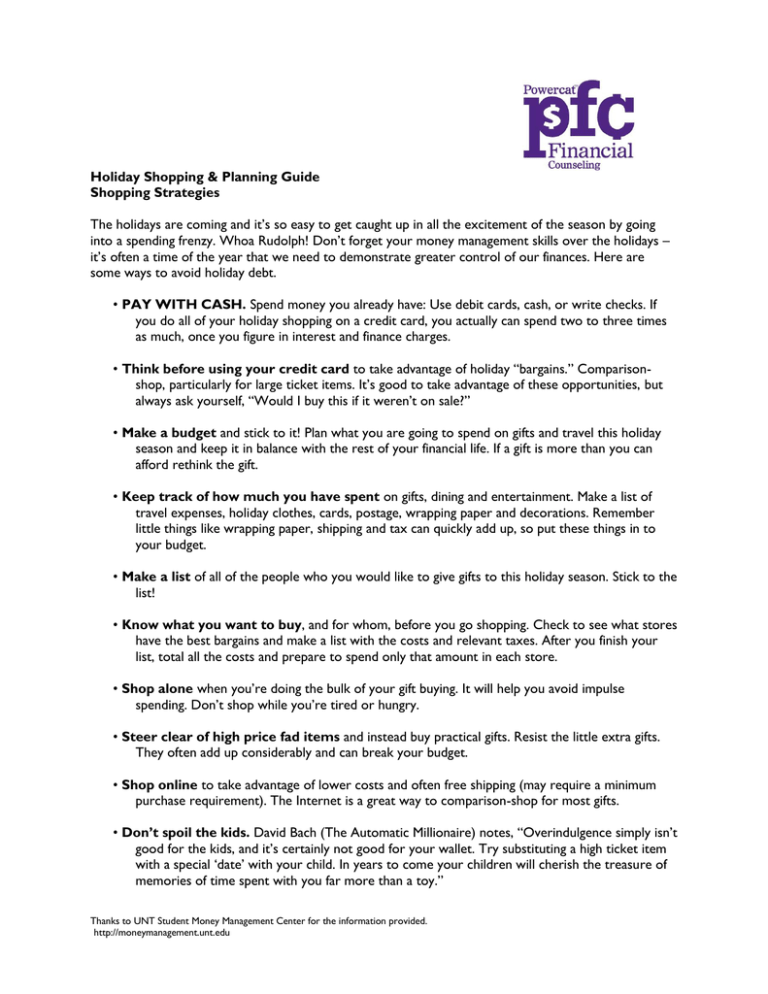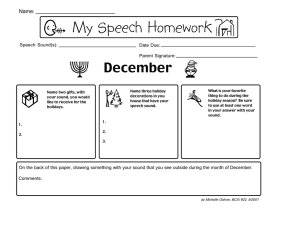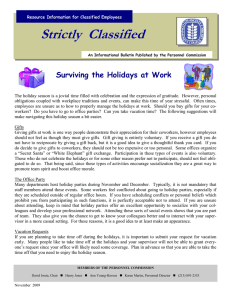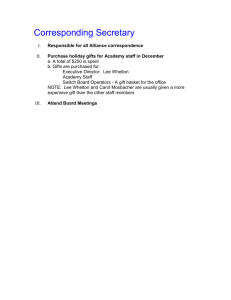Document 12977244
advertisement

Holiday Shopping & Planning Guide Shopping Strategies The holidays are coming and it’s so easy to get caught up in all the excitement of the season by going into a spending frenzy. Whoa Rudolph! Don’t forget your money management skills over the holidays – it’s often a time of the year that we need to demonstrate greater control of our finances. Here are some ways to avoid holiday debt. • PAY WITH CASH. Spend money you already have: Use debit cards, cash, or write checks. If you do all of your holiday shopping on a credit card, you actually can spend two to three times as much, once you figure in interest and finance charges. • Think before using your credit card to take advantage of holiday “bargains.” Comparisonshop, particularly for large ticket items. It’s good to take advantage of these opportunities, but always ask yourself, “Would I buy this if it weren’t on sale?” • Make a budget and stick to it! Plan what you are going to spend on gifts and travel this holiday season and keep it in balance with the rest of your financial life. If a gift is more than you can afford rethink the gift. • Keep track of how much you have spent on gifts, dining and entertainment. Make a list of travel expenses, holiday clothes, cards, postage, wrapping paper and decorations. Remember little things like wrapping paper, shipping and tax can quickly add up, so put these things in to your budget. • Make a list of all of the people who you would like to give gifts to this holiday season. Stick to the list! • Know what you want to buy, and for whom, before you go shopping. Check to see what stores have the best bargains and make a list with the costs and relevant taxes. After you finish your list, total all the costs and prepare to spend only that amount in each store. • Shop alone when you’re doing the bulk of your gift buying. It will help you avoid impulse spending. Don’t shop while you’re tired or hungry. • Steer clear of high price fad items and instead buy practical gifts. Resist the little extra gifts. They often add up considerably and can break your budget. • Shop online to take advantage of lower costs and often free shipping (may require a minimum purchase requirement). The Internet is a great way to comparison-shop for most gifts. • Don’t spoil the kids. David Bach (The Automatic Millionaire) notes, “Overindulgence simply isn’t good for the kids, and it’s certainly not good for your wallet. Try substituting a high ticket item with a special ‘date’ with your child. In years to come your children will cherish the treasure of memories of time spent with you far more than a toy.” Thanks to UNT Student Money Management Center for the information provided. http://moneymanagement.unt.edu Holiday Planning • Focus On Experiences, Not Gifts. You probably can’t remember the majority of the gifts you gave or received as children, but you probably have holiday memories around events or family times that you treasure. It’s never too late to create traditions your family can enjoy year after year. You may even want to explore your family’s ethnic heritage to find new holiday traditions you can incorporate into your celebration. An Internet search can yield a lot of information on holiday traditions. Another good source is your local library where you may want to check out books on traditions such as The Book of New Family Traditions: How to Create Great Rituals for Holidays & Everyday by Meg Cox. • Create a Family Gift-making Project. Get the whole family involved in a gift-making project. Homemade ornaments, framed photos, breads or jams, potted plants (decorate the pot if you’re so inclined) and soap are just a few of the ideas to choose from. Remember to start early so you have time for mistakes and make extras to keep on hand for last minute gifts. Your local craft store can be a good source of information and inspiration. • Play “Secret Santa.” If you have children, they’ll love this project: try to surprise neighbors or family members with good deeds without getting caught. Your kids may do a sibling’s chore while they’re out. Or leave homemade cookies on a neighbor’s doorstep, ring the doorbell and try to run away before they answer the door. You may be surprised at how carried away your kids will get with this one! • Give of Yourself. Create gift certificates offering services to your friends, neighbors or children’s teachers. They can range from a car wash and wax to a couple of hours running errands. Be creative and get the family involved when possible. • Ask for Gift Receipts when you buy gifts and include them with the item you are giving. It will make it a lot easier for the person who received the gift to return or exchange it if needed. • Stock Up. Buy gifts throughout the year – start a “gift closet” to store your purchases. Take advantage of deep discounts and sales throughout the year. Keep small “universal” gifts (candles, picture frames, etc) on hand for the holidays or for times when you need a gift but don’t have time to find one. • Be Thankful. When we’re bombarded with holiday advertising, it’s easy to lose sight of the things that are really important. Create a holiday tradition of counting your blessings. Consider a family project where everyone writes things they are thankful for, including notes of appreciation to family members, on slips of paper. Place those notes in a jar to be read on a special holiday. • Don’t Forget Others. Look to local charities such as food banks, churches, shelters, and programs such as the Salvation Army Angel Tree to assist others in need. Many families struggle to provide presents for their children during the holidays and even a small donation of a toy can be incredibly meaningful to a child in need. Your time as a volunteer is also greatly appreciated. Sources: www.consolidatedcredit.org and www.finance .yahoo.com/print/expert/article/millionaire Powercat Financial Counseling 809 K-State Student Union 785-532-2889 powercatfinancial@ksu.edu www.k-state.edu/pfc



![[Article for use in a utility company newsletter]](http://s2.studylib.net/store/data/011496369_1-a21e48223df55b0146bed27004029b77-300x300.png)
